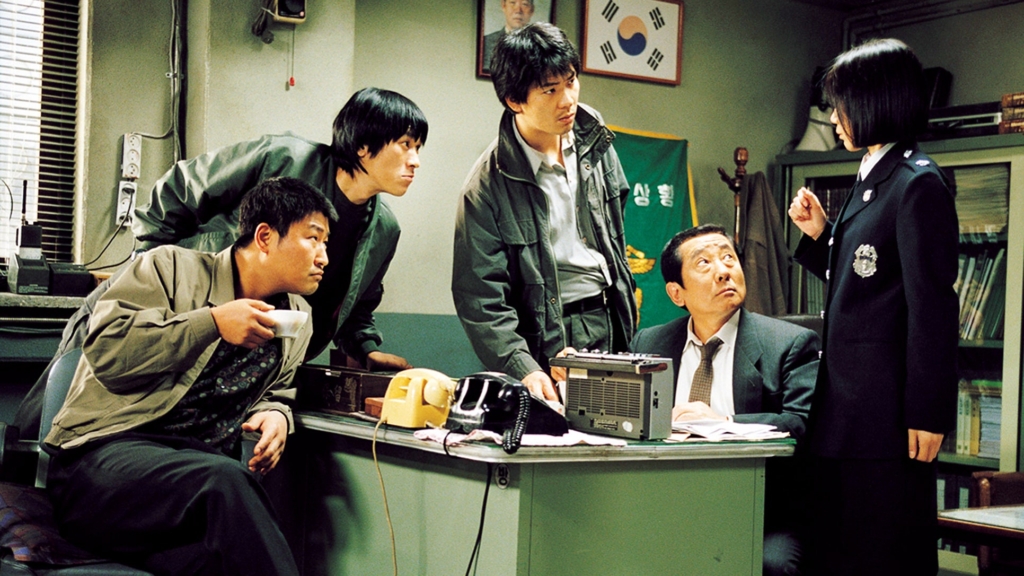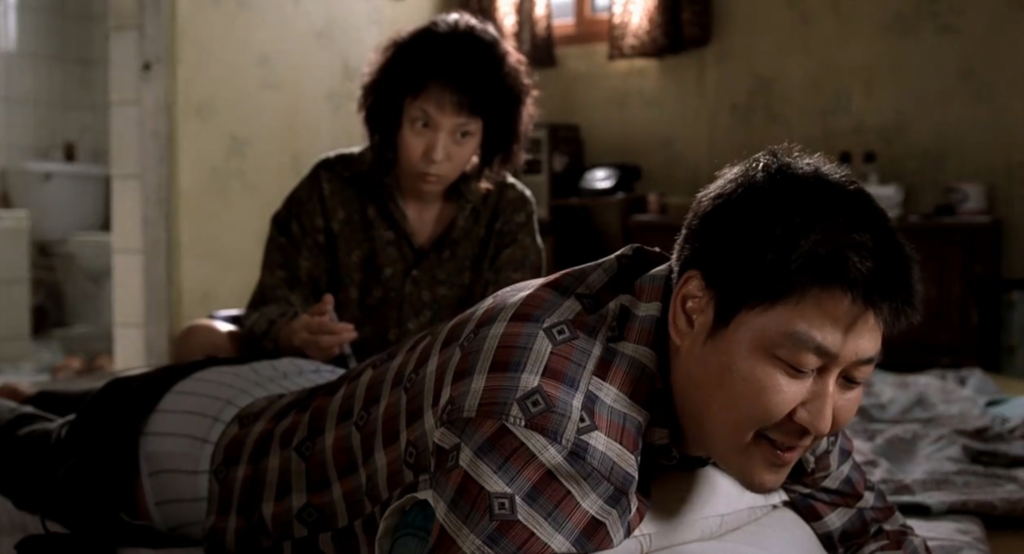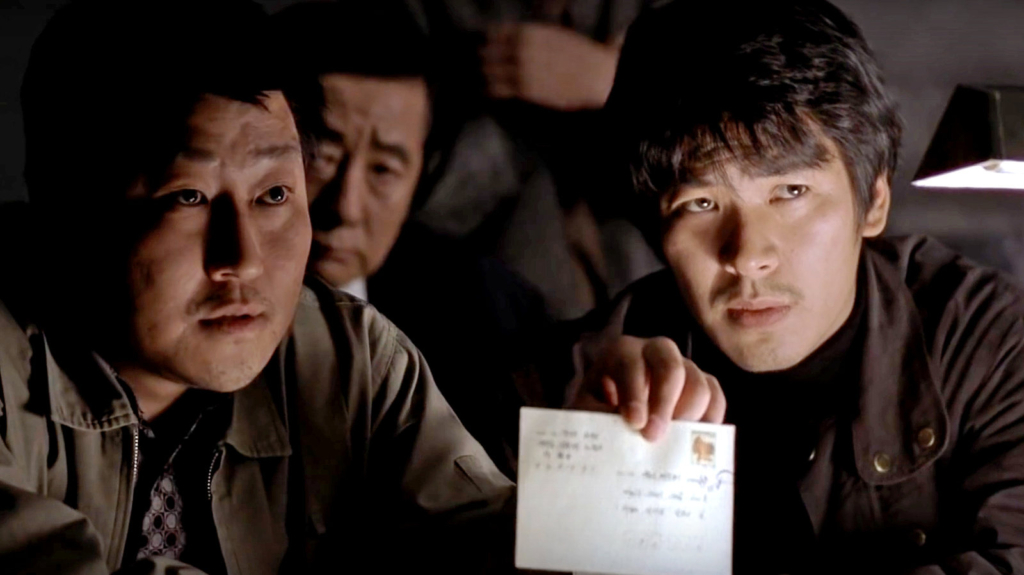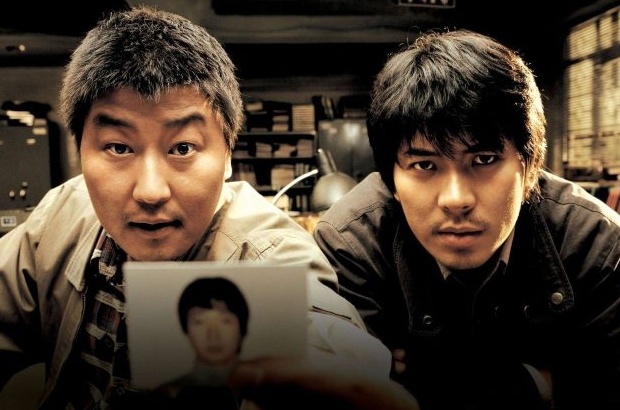SHANTI GIOVANNETTI-SINGH reviews Bong Joon-ho’s 2003 feature film, Memories of Murder which was recently screeened as part of Camden Markets open air cinemas, done in collaboration with Curzon.
Visiting Curzon x Camden Market’s open air cinema is a guaranteed source of tranquility and pleasure. Sinking into your linen deck chair, whilst you savour the slowly setting sun and sweet aroma of freshly made popcorn, you will be filled with a calmness almost unbeknown to 2020. Within the first few seconds of Bong Joon-ho’s Memories of Murder (2003), however, this feeling of peace will quickly subside. As the camera focuses on a festering corpse – which you soon realise is a young woman who has been strangled using her own lingerie – you will be haunted by the sheer violation that this image conjures. This sensation of disgust and unease is one that will follow you throughout the film and remain with you long after the closing credits.

Memories of Murder is Bong Joon-ho’s second feature film, and although it was aired nearly two decades before the oscar-winning Parasite (2019), it contains Joon-ho’s signature juxtaposition of brutal violence and light-hearted comedy. Torture scenes are undercut by crude humour, severed flesh is juxtaposed with grilled meat, and harrowing images are lightened by physical comedy. Based on the real-life Hwaseong serial murders of 1986-1991, the film is a gripping whodunnit about a series of unusual murders and rapes. Occuring only on rainy days to women wearing red, after a specific song is broadcast on a local radio station, the murderer would always kill his victims using their own lingerie. The investigation is led by the local detective Park Doo-man, played by Song Kang-ho. From the opening scene, however, Joon-ho makes you doubt Doo-man’s suitability as inspector in chief, due to his comic and clumsy aura, and general incompetence. Doo-man is assisted by an equally inexperienced and incapable team of local police officers, as well as the young, though comparatively expert, detective from Seoul Seo Tae-yoon (Kim Sang-Kyung). Using a variety of unorthodox and morally questionable methods of interrogation (including stake outs in saunas to spot men without pubic hair), it is hardly surprising that the murders go unsolved at the end of the film.

Although in many ways the conventional crime thriller, Joon-ho’s most striking departure from the genre can be observed by his presentation of femininity. Given Memories of Murder’s subject matter– a Jack-the-ripper-esque series of murders – it would have been easy to slip into clichés about helpless women who are murdered by manic men with troubled pyschosexualities. In Memories of Murder, however, Joon-ho proposes a complex and multi-dimensional portrayal of femininity. Far from passive victims, the women in the film are unique, intelligent and well-developed. Women and girls drive the narrative, propelling an otherwise directionless investigation, with their knowledge and observations- although these women are rarely – if ever – acknowledged by the male characters for their contributions. Whilst it is Kwon Kwi-ok (the only female police officer on the team) who finds out about the ‘lonely man’ who requests the same old pop-song to be played on a local station on the nights that the murders take place, she is never openly praised for this discovery. The young school-girl who informs the police officer of the man who ‘lives underground and comes out at night’ is initially dismissed and ignored. The team of detectives only think to question a survivor of the rapes, who informs the team of the murderer’s strikingly soft hands, late into the investigation. In a particularly striking scene, Doo-man is informed of the ‘Baek lady killers’ by his girlfriend Kwok Seol-yung, as he lays on her lap the very image of helplessness, whilst she plucks his ear hair. Unlike in Hollywood blockbusters, progress is not made by men with guns, but rather through information gained through village gossip and quiet observation.

Despite Joon-ho’s suggestion in Memories of Murder that humane and community based forms of investigations are the most effective forms of police work, there is no shortage of male police officers who use violence and brutality to coerce suspects into confessing crimes they have not committed. Joon-ho does not shy away from showcasing abhorrently graphic torture scenes which take place in the interrogation room. It is important, however, not to misinterpret these scenes as Joon-ho’s sympathy towards police violence and coercion. If anything, these instances emphasise the opposite, as they cast the protagonists in a deeply unflattering light. Whilst of course the shots of the murders are disturbing and deeply unsettling, the torture scenes which occur during police custody are arguably much more troubling. Deeply violent, excessively aggressive and utterly unnecessary, these are incredibly difficult scenes to digest.
One of the most captivating aspects of the film is the way in which Joon-ho constantly subverts your attitude towards the various characters in the film. In a particularly climactic moment, Park Hyeon-gyu (the final suspect who, up until this point, appears almost definitely guilty) begins to confess, adding ‘What does it matter if I did it or not, you’ll make me confess anyway’. At this point we no longer see a crazed psychosexual murderer, but an individual who has been subject to hours of psychological torture and manipulation. This very explicit police brutality is particularly harrowing to watch in today’s society, where the world is still very much in the process of mourning George Floyd, Breonna Taylor and countless others. Whilst the condemnation of police brutality can be seen as a relatively new social movement, with the Black Lives Matter movement only being founded in 2013, protests against police violence are particularly relevant to the 1980s in Korea. A series of anti-government protests reached a climax in the late 1980s following the Gwangju masscre of 1987 and the murder of Park Jong-Chul in police custody. Whilst not at the forefront of the film’s focus, the socio-political context of the film is something which Joon-ho discreetly alludes to in the film. Protesters disrupt the crime scene, bomb drills and blackouts occur and journalists expose the brutal interrogation techniques used by Doo-man and his team. In Memories of Murder, Joon-ho paints a society seething with unrest, but he does so in a subtle, though poignant, manner.

Although the murders at the core of Memories of Murder remain unsolved, the film’s success spurred the re-opening of the previously abandoned Hwaseong murders case. This culminated in the conviction of Lee Choon-jae, who confessed to murdering his sister-in-law and 14 other people. In many ways, this is the artist’s ultimate success, as Joon-ho’s narrative transcended the film, and improved the world in a very direct and tangible way, providing solace and justice to those affected by the Hwaseong murders. This success, however, is somewhat mediated by Joon-ho’s deconstruction of the typical cinematic villain and his unfavourable depiction of the police and their methods. This impression is concreted by the film’s poignant ending, in which a school girl inadvertently informs Doo-man that she has seen the murderer. When asked to describe him, she says he was ‘normal-looking’ and ordinary. People who commit heinous crimes are not the visibly monstrous criminals of Hollywood crime thrillers and vintage James Bonds. Instead, they are normal, everyday people, who are our neighbours, our colleagues, our families and our friends.
Trailer: https://www.youtube.com/watch?v=0n_HQwQU8ls
Camden Market x Curzon: https://www.camdenmarket.com/curzon
Featured Image Source: IndieWire





